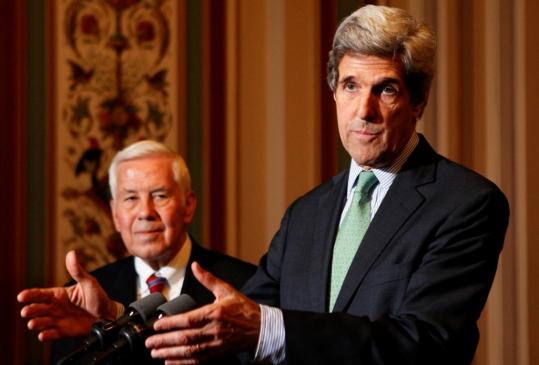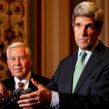
Moscow’s Perspective on the Tactical Gamble and Strategic Consequences of the New START Treaty: Part Two
Publication: Eurasia Daily Monitor Volume: 7 Issue: 67
By:

While the Russian press has noted the pledges from Senators John Kerry and Richard Lugar, members of the Senate Committee on Foreign Relations, to begin the ratification process on the new Strategic Arms Reduction Treaty (START) immediately after its signing in Prague on April 8, the deeper issue remains as to whether Lugar can secure sufficient support from other moderate Republicans to ensure a two-thirds vote for ratification. Given the commitment of the Republican Party since Ronald Reagan to strategic defense, they expect the Senate hearings on the treaty to focus on any hidden agendas that might limit US freedom of action in this area. While former diplomats and arms control experts from both Republican and Democratic administrations have endorsed the treaty as a necessary step towards the development of the “reset” in US-Russian relations and toward a global regime to remove nuclear weapons, others have questioned the wisdom of both goals. There exists a significant chance that the current bitter partisan conflict in Washington will restrict any prospect of a speedy, bipartisan ratification process. Nikolai Snezhkov highlighted remarks by Ileana Ros-Lehtinen, Republican member of the House Committee on Foreign Relations. She cast the issue of ratification in the context of the emerging competition between the US and China, asking: “Why limit our military potential by a treaty which completely ignores the capability of China, which, if it decided to do it, could rapidly develop its own large nuclear arsenal?” She promised a detailed review of the treaty’s provisions and warned that Republicans would “not permit the slightest harm to American interests in missile defense.” Snezhkov left the fate of the treaty subject to US partisan politics and the emerging nuclear calculus between Beijing and Washington (Vremya Novostei, March 31).
Fyodor Lukyanov, the editor of Russia in Global Politics, provided a deeper explanation of what he calls “the last treaty” from the Cold War era. He notes that Moscow has, since the signing of START I, sought to continue the arms control focus of US-Russian relations, as a way of assuring its own international position as economic realities compelled a reduction in its strategic arsenal. The Bush administration, which declared the Cold War over and then withdrew from the Anti-Ballistic Missile (ABM) Treaty in 2002, saw no reason to continue such a regime because it limited US freedom of action as the sole super power. The Obama administration on the other hand, in a reassessment of the US global position, has made the “reset” of relations with Moscow part of its national security strategy. This reset is not between geostrategic equals, but a global power and a regional power, where conflicts threatened to undermine the very flexibility that the Bush administration had so treasured. Both sides engaged in serious negotiations and reached compromise solutions. Lukyanov sees the current treaty as part of a larger strategy associated with moving towards a nuclear-free world and the capital derived by Washington from concluding the treaty prior to the April Nuclear Summit and the May conference to review the Nuclear Non-Proliferation Treaty. If Moscow’s position as a leading power is confirmed by the treaty, the US gains a tool to shift the focus of nuclear arms reductions to a global forum. However, Lukyanov sees little prospect for progress, because the driving force shaping the nuclear arsenals of other sides is not the US-Russian strategic balance, but regional conflicts where nuclear weapons permit weaker powers to maintain a credible deterrence against opponents with stronger conventional forces, as is the case of Pakistan with India. Long-range ballistic missiles are not needed for such deterrence, and tactical nuclear disarmament raises the risk of an intense conventional arms race, including one for Russia when it seeks to secure its own territorial integrity to prevent Chinese aggression. In this sense, Lukyanov considers the current treaty as the end of an arms control era, and the beginning of a new and more complex process with global ramifications. He does not envisage the emergence of any type of global security architecture that would justify trust in its ability to manage regional conflicts. Short of forming such a mechanism, the treaty will be seen as a tactical political success in Moscow and Washington, but not a breakthrough in global security (Vremya Novostei, March 29).
Melor Sturua, the US correspondent for Izvestiya, focused on the tactical success of the negotiation process and praised Obama and Medvedev for finding the ways and means to reach workable compromises. In the face of each roadblock, the presidents used personal meetings and telephone conversations to find a way forward. Although both had heavy domestic agendas and other foreign policy concerns, they gave their time and goodwill to concluding the negotiation process. Among the compromises to which Sturua draws attention, are those associated with Obama’s admission of the mutual relationship between offensive and defense strategic weapons systems and the problem of verification. He correctly noted that Obama admitted the mutual relationship, but did not agree to include technical language addressing the issue. On the verification regime, Sturua noted the claim by Russian negotiators that the concessions made by Soviet negotiators in this area in 1991 were excessive and costly. The result was a compromise, allowing the US to accept changes in such areas as the exchange of telemetric data from missile flights. As to the significance of the agreement, Sturua emphasized the very nature of the process as symbolizing the end of one era and the beginning of another: “The new agreement is not perfect, but the fruit of compromise. However, its historical and symbolic significance is huge. It puts an end to the epoch of the Cold War and opens a new page in the area of disarmament in the 21st century” (Izvestiya, March 30).
The problem, with this tactical focus on the negotiation process is that it ignores the limited significance of the cuts both sides will make. Polina Khimshiashvili and Natalya Kostenko, noting comments by experts on strategic nuclear arms, described the actual reductions of offensive strategic arsenals as minimal and involving no limitations on current plans for military modernization (Vedomosti, March 29). Moreover, even before the treaty is signed in Prague, concerns about the ratification process in Washington are being raised.
The signing in Prague will end US-Russian strategic arms negotiations. It is still unclear whether it will deepen the “reset,” or open what the Obama administration seeks to be the first step towards global nuclear arms reduction. Moscow understands that it will not be at the center of this activity, but only a regional player in a complex process. If that process fails, Russia will have much to lose, due to the geostrategic dynamics of nuclear proliferation in Eurasia. Both Medvedev and Obama have made a tactical deal to serve each country’s national interests and they have much to fear if the treaty is not ratified or facilitates the desired response by other powers to agree limits on their arsenals.




